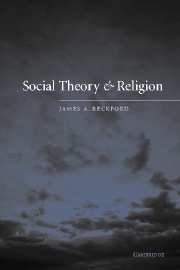1 - Religion: a social constructionist approach
Published online by Cambridge University Press: 18 December 2009
Summary
“Wise is he who recognises that Truth is One and one only, but wiser still the one who accepts tha Truth is called by many names, and approached from myriad routes.”
Introduction
This book will examine a wide range of theoretical ideas that have a bearing on topics central to the study of religion today – secularisation, pluralism, globalisation and religious movements. These ideas are associated with concepts as diverse as identity, gender, self-reflexivity andpost-modernity. In turn, these concepts take their meanings from broad frameworks of theoretical ideas. That is, the frameworks act like scaffolding or codes that structure relations between the concepts, thereby lending them distinctive meaning and significance. Social theory, in my sense of the term, consists primarily of frameworks of concepts configured in such a way as to offer accounts of social phenomena at a relatively high level of generality.
Some theoretical frameworks consist of logically interrelated assumptions and propositions from which testable hypotheses can be derived. Others are much looser assemblages of concepts that merely sensitise social scientists to interesting ways of interpreting the social world. For my purposes, they all belong to the broad category of social theory, regardless of whether the theorists who create them believe that the frameworks are true depictions of reality (and of what makes it real) or merely helpful devices for casting light in dark corners. Nicos Mouzelis (1995) labels these two attitudes to the purpose of social theory respectively ‘end-product’ and ‘tool’.
- Type
- Chapter
- Information
- Social Theory and Religion , pp. 11 - 29Publisher: Cambridge University PressPrint publication year: 2003



